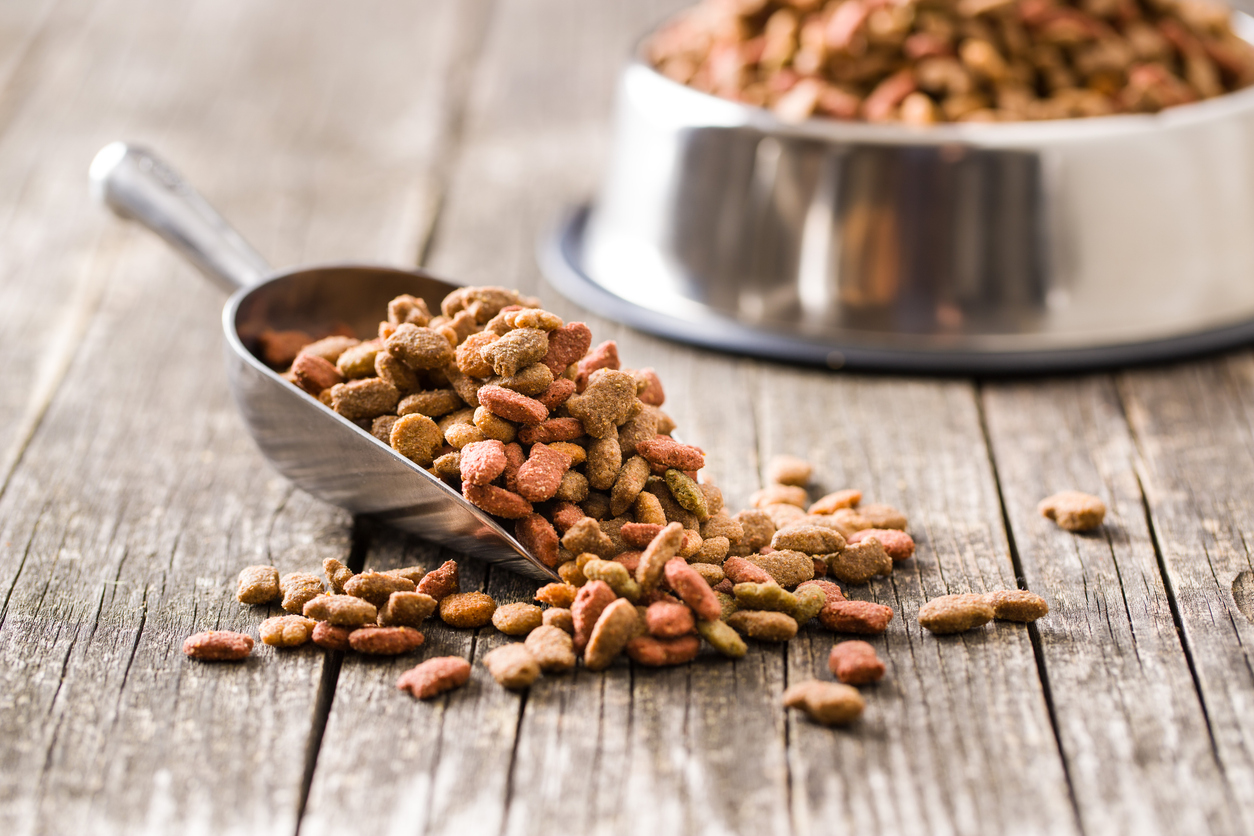Dog Food Brands to Avoid: A Look at the FDA’s Warning on Grain-Free Diets

Dry pet food. Dry kibble food in scoop.
As pet owners, we strive to provide the best nutrition for our furry companions. However, recent findings by the Food and Drug Administration (FDA) have cast a shadow of doubt over certain dog food brands, particularly those marketed as “grain-free.” These foods, which often contain peas, lentils, or potatoes, have been linked to an increased risk of canine dilated cardiomyopathy (DCM), a serious heart condition.
In this blog, we’ll explain the findings of the FDA’s investigation, explore the potential risks associated with these grain-free diets, and discuss why some veterinary professionals are urging pet owners to reconsider the foods they feed their dogs.
The FDA’s Investigation into Grain-Free Dog Foods
In 2018, the FDA began investigating a troubling rise in cases of canine dilated cardiomyopathy (DCM), particularly among breeds not typically predisposed to the condition. DCM is a disease of the heart muscle that results in an enlarged heart and weakened contractions, ultimately leading to congestive heart failure. While this condition is more common in large dog breeds like Great Danes and German Shepherds, the FDA noted an uptick in cases among smaller breeds, such as Beagles and Springer Spaniels, which raised alarms within the veterinary community.
The common link? Many of these dogs were on grain-free diets, prompting the FDA to delve deeper into the ingredients in these foods. Over 500 reports have since been filed, suggesting a potential connection between grain-free dog foods and DCM. In response, the FDA identified 16 brands most frequently associated with these reports.
The 16 Brands Under Scrutiny
The FDA has not explicitly recommended avoiding these brands, but the agency has named them as part of its ongoing investigation. The brands, ordered by the number of cases linked to them, include:
- Acana
- Zignature
- Taste of the Wild
- 4Health
- Earthborn Holistic
- Blue Buffalo
- Nature’s Domain
- Fromm
- Merrick
- California Natural
- Natural Balance
- Orijen
- Nature’s Variety
- NutriSource
- Nutro
- Rachael Ray Nutrish
These brands are known for their “grain-free” formulations, which are typically marketed as healthier alternatives to traditional dog foods. However, as the FDA’s investigation suggests, these diets may carry unintended risks.
Understanding the Risk: Canine Dilated Cardiomyopathy
DCM is a serious condition that can lead to heart failure if left untreated. While some dog breeds are genetically predisposed to DCM, the recent cases reported to the FDA involved breeds not typically associated with this heart condition. This anomaly prompted further investigation, revealing a potential link to grain-free diets.
The exact cause of DCM in these cases is still under investigation. However, many of the grain-free diets implicated are rich in legumes like peas and lentils, or tubers like potatoes. These ingredients are used as substitutes for grains, but there is growing concern that they may interfere with taurine absorption, an amino acid essential for heart health in dogs. Taurine deficiency has been known to contribute to the development of DCM in dogs.
Why Grain-Free Diets Became Popular
The trend toward grain-free pet foods likely stems from human dietary trends and misconceptions about canine nutrition. Many pet owners mistakenly believe that grains are harmful to dogs or that dogs should follow a diet similar to their wild ancestors, such as wolves. However, this belief overlooks the fact that domestic dogs have evolved alongside humans and are capable of digesting grains. In fact, grains can be a valuable source of nutrients in a dog’s diet.
Veterinary experts emphasize that there is no scientifically proven benefit to grain-free diets. Unlike humans, dogs do not suffer from gluten intolerance or celiac disease, and the vast majority can digest grains without any issues.
What Veterinarians Are Advising
While the FDA has not yet recommended that pet owners stop feeding their dogs these grain-free brands, many veterinary cardiologists are taking a more cautious approach. Dr. Anna Gelzer, a veterinary cardiologist at the University of Pennsylvania, advises pet owners to switch to non-grain-free diets if their dogs are currently on one. She emphasizes that there is no clear benefit to these diets, and given the potential risks, it’s better to err on the side of caution.
“Why take a chance?” Gelzer asks. “There’s no scientifically proven benefit to grain-free foods, so why take a chance?”
Making Informed Decisions for Your Pet’s Health
As pet owners, it can be challenging to navigate the ever-changing landscape of pet nutrition. The key takeaway from the FDA’s investigation is the importance of being informed and consulting with your veterinarian when choosing your dog’s diet. While the FDA continues to investigate, it may be wise to consider alternative diets that include grains, especially if your dog belongs to a breed not typically associated with DCM.
The bottom line is this: your dog’s health and well-being should always come first. Stay informed, consult with your veterinarian, and make dietary choices that support your dog’s long-term health.
Conclusion
The FDA’s ongoing investigation into the potential link between grain-free dog foods and canine dilated cardiomyopathy is a critical reminder of the importance of careful consideration when it comes to our pets’ diets. While the investigation continues, pet owners should remain vigilant and consult with their veterinarians to ensure they are making the best dietary choices for their dogs.
Remember, just because a dog food is marketed as “healthy” or “natural” doesn’t necessarily mean it’s the best choice for your pet. Stay informed, prioritize your dog’s health, and always seek professional advice when in doubt.
Your Pet’s Best Interest, Always
At Pet Institute, we take pet care seriously. We're dedicated to transparency, impartiality, and the well-being of your pets in every article, review, and recommendation we provide. Our unwavering commitment to these principles ensures that you, our valued reader, always receive reliable and unbiased information. Let us be your trusted guide in the world of pet care and companionship.